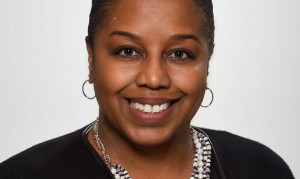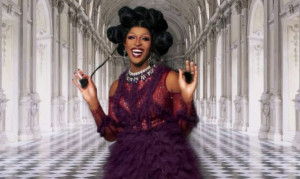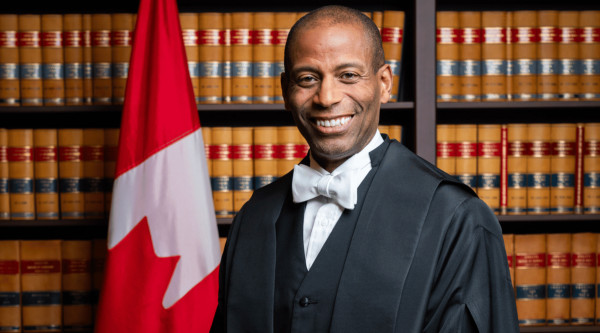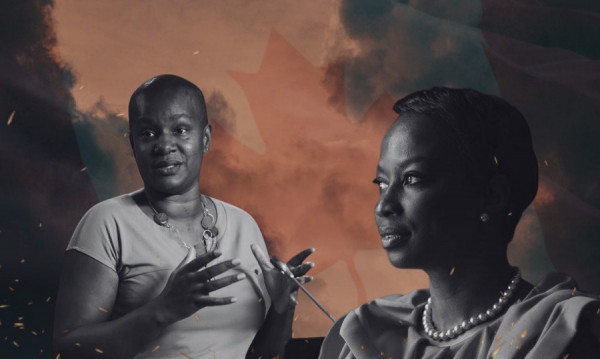The first Black Cabinet Minister of the Province of Manitoba, Gordon represents the Progressive Conservative Party. She was among the first Black Members of the Legislative Assembly of the province representing the Southdale District since September 2019. Gordon was appointed to the new Cabinet Minister position on January 5, 2021. She has an MBA and BA from the University of Manitoba, has certificates in Change Management and Applied Counseling, and is married with two children.
Minister Audrey Gordon was born in Jamaica as the seventh of eight children. Her family immigrated to Canada in the early 1970s when she was just five years old. They settled in Winnipeg, Manitoba, where she has lived ever since. Gordon, born to devout Christian parents and raised with strong Christian values, was heavily influenced by her parents, especially her father, though she also recognizes she had different mentors at different stages of her journey.
“My father was mostly self-educated, very politically astute, and very bright,” says Gordon. Gordon’s father was a custom concrete contractor who passed away three years ago. Still, their conversations about not giving up and always believing in yourself linger in Gordon’s memory; valuable lessons that have stayed with her until today. Her father helped shape and inspire her academic achievements, career, and life goals. To this day, her father’s positive words of encouragement bring solace to Gordon. “No one can take from you what you have in your head,” quotes Gordon, often repeating his words of wisdom to others. Her mother, a health care aide, instilled ideas of giving back to the community and how to live a good life.
Early Struggle with Diversity, Inclusion and Racial Equity
“I never really knew that I was different until I came to Canada,” Gordon says, recalling her difficulty at first integrating into Canadian society. “To be honest with you, I can’t remember ever liking school but I had to get through it somehow,” she admits. In high school, she would often avoid walking down the hallways to avoid encounters with one of her bullies.
Gordon remembers dropping off a job application at a restaurant in-person when she was in high school. She wasn’t called for the position she applied for, while her peers with equal or lesser skills were not only interviewed but also immediately offered positions at the establishment. When she was finally called to come in for orientation, Gordon was instead assigned a cleaning position in the dining room. This experience chipped away at her emotional well-being.
“I wasn’t good enough to be a cashier or work where I would be interacted with, but I was good enough to clean tables,” Gordon muses. “One day, the cashier phoned in sick, and I was assigned to fill in with little orientation, '' remembers Gordon, forced to quickly learn the basics of filling customer’s orders during rush hours. Emphasizing the importance of proving oneself, Gordon adds, “They never saw me as the cashier because they had probably never seen a Black cashier, but I started to be placed on cash after that.”
Gordon finally felt a sense of belonging after discovering her passion for sports in high school. “I tried out for all of the sports teams I could and finally made the cheerleading team,” she recalls. She felt like she was finally part of a community, and discovered a passion for sports that has stayed with her until today.
Though Gordon’s story ended on a positive note, she acknowledges this isn’t the case for so many others. “Some people are underemployed, lost their way, and might be dealing with mental health or addiction,” Gordon remarks.
Gordon no longer feels different or unaccepted anymore. However, she challenges people who say there’s no such thing as racism and discrimination.
In August 2020, Gordon was the victim of a racist attack when a bench with her image on it was defaced with graffiti.
“I don’t want to blame society but discrimination and racism do run deep, and they are barriers to the progression of our nation,” Gordon asserts. According to the Cabinet Minister, racism needs to be rooted out, called out, and eradicated. “No form of racism should be entertained and people need to be held accountable for their behaviours and their conduct.”
Gordon also believes that Black people belong in places where decisions are made and she desires to see Black achievement on a large scale. She asks, “I've been there, but how do we move forward?” Gordon believes the answer is to place importance on moving in a unified direction and having Black spokespersons who can represent people of colour and other minority communities. “We need to say yes we can, mean it, and go after our ambitions with passion, grit, perseverance, and determination.”
Gordon has many passions in life. She is deeply interested in health and wellness, with her areas of particular interest being mental health and addiction. Besides that, she is passionate about art, sports, serving the community, gardening, and reading. An avid reader, Gordon names Nelson Mandella’s “A Long Walk to Freedom” as her favourite book, and also admires literary works about Black pioneers who came before her; people whose legacy she believes she’s building on.
Overcoming the Biggest Obstacle in Life
Early on, one of Gordon’s biggest obstacles was her own mind and perspectives. “I didn't believe in myself even though I had a lot of support from family and friends, so I remember turning down really good opportunities because I didn’t think I deserved them,” confesses Gordon. It wasn't until she went on to do her master's program that she finally started believing in herself. She says it would not have been possible without the constant outpouring of support from her professors and speakers at the MBA Program. Gordon had found the confidence to say “yes” to her opportunities after that experience.
Gordon often relies on the Bible to find solace from her work. Her favourite verse is Galatians 6:9: "Let us not become weary in doing good.” She says, “I don't have idle time, so I schedule my days and think about how to maximize my time.” But she isn’t perfect. “I recognize when I'm not balanced, so I make plans to get my life back in balance very quickly because when you're not in balance, your health begins to suffer, and you're in no position to help the people you’re tasked to serve.”
Life Philosophy and Life-Defining Moments
“I want to positively impact people's lives at an individual level by being genuine, authentic, sincere, and open,” Gordon says. Like most people, she just wants to live a good life and leave a legacy that her children and her family can be proud of. Aside from raising children and having a happy marriage, Gordon recounts several life-defining moments, both in her academic and professional life.
A few such defining moments occurred while working towards her MBA. After a successful elevator pitch, Gordon was selected, out of a class of 35 students, to join delegates of the University of Manitoba in New York City for the bell-ringing ceremony at NASDAQ. Another being the completion of her MBA with distinction; an affirmation of her hard work, acquired skills, and natural ability.
One of the biggest highlights of Gordon’s career, however, was being elected as a Member of the Legislative Assembly for Southdale where she was sworn in as the first Black MLA to take her seat at the Manitoba Legislature. Most recently, she was also appointed the first-ever Minister for Mental Health, Wellness and Recovery.
Gordon was humbled and honoured when Premier Brian Pallister selected her for this role. Of the event, Gordon says, “He never mentioned my colour, my ethnicity, or my race. He mentioned that I received this appointment on merit and that deeply impacted me.” Gordon adds, “He told me that I never gave up, I worked hard, and demonstrated that I have what it takes to be a great Minister.”
From Art to Politics
Gordon’s dream was to become a commercial artist. “Art is the beautiful expression of our inner person, thoughts, intuitions, and emotions,” she states. Gordon sold her first art piece, “Black Jesus,” when she was 16. She gave up on art when her college application for the Art Program was rejected.
Gordon worked in public health for over 20 years, and that exposure contributed to her political ambitions. Her life in politics began with an assignment to assisting the Deputy Minister of Labor and Immigration. The position, originally a six-month stint, grew into three and a half years. “I was very blessed to work with an amazing, reassuring, and confident Deputy Minister of Labor, Tom Farrell,” gushes Gordon of her experience with the Minister, a mentor who taught her the inner workings of government and sparked her passion for politics. “He gave me access to rooms and people that many other assistants didn’t have, and took me to every single meeting.”
Gordon finds politics to be the most rewarding and fulfilling occupation on the planet because it empowers individuals to support people and resolve their problems. Conversely, she acknowledges that politics isn’t without its fair share of challenges. “It’s not easy and people are not always kind,” she warns. “It requires a thick skin, forgetting about yourself, your hang-ups, your biases, and being ever-present in another person's life.” She admires many politicians, but her favourites are Brian Pallister, the Premier of Manitoba, and Kamala Harris, the new U.S. Vice President.
Gordon is extremely enthusiastic about her new position with the Ministry. “My goal is to ensure that we have a mental health, addictions, and recovery system that focuses on healing and hope,” Gordon states committedly. Understanding that different approaches and services need to be incorporated to meet the individual needs, Gordon adds, “I want to take a whole-of-government integrated approach that considers the client or the patient at an individual level.”
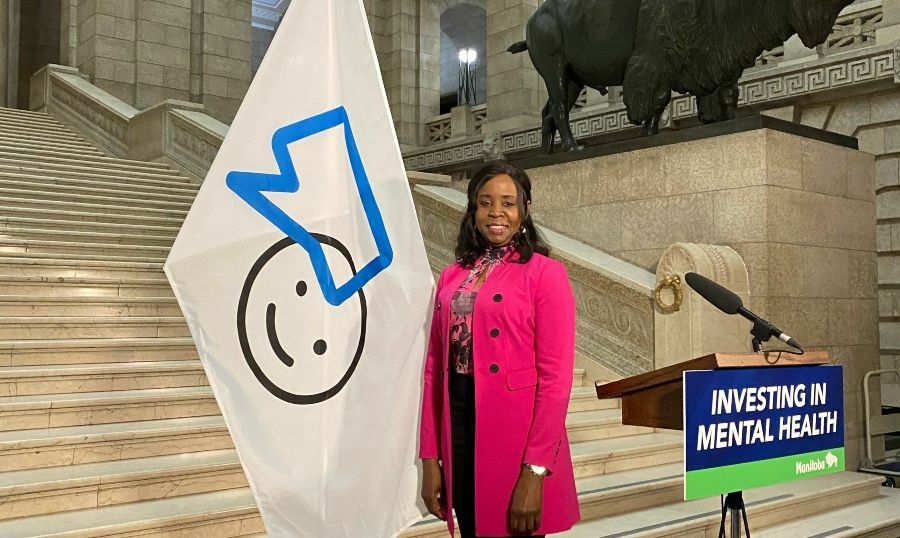
Gordon is looking forward to leveraging her knowledge and experiences from her multifaceted background in counselling and change management, as well as her extensive experience with Indigenous communities, to serve in the new department of health. She is also looking forward to broadening her understanding of mental health and addiction.
Gordon draws again from her father’s wisdom who once said, “If there’s a ladder to climb, climb it.” Gordon sees many opportunities where she can be of value in her new political position, and that has inspired her hopes to run for re-election to serve her country, her community, and the people. She hopes to impact politics not only at the provincial and federal levels but also at the international level; this includes her native Jamaica.
Gordon strongly advises youth to take inspiration from poet Amanda Gorman’s “The Hill We Climb”, which the 22-year-old Black poet recited at the 2021 U.S. Presidential inauguration. She also advises them to find mentors along their journey. Her message to young Black girls specifically, is to dream big and believe in themselves as women.
“As women, we were stronger, are stronger, and will stay stronger as long as we are moving forward together.”
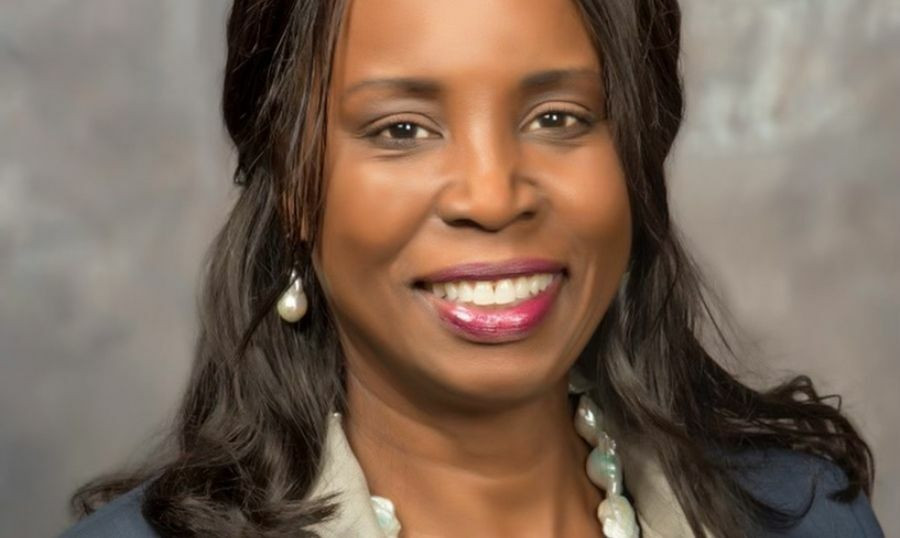
 By
By 




